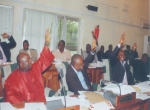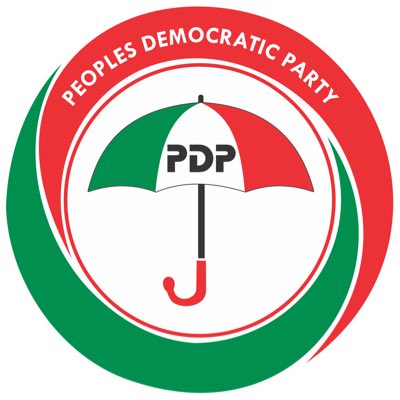Politics
Accord Party Suffers Set Back In Rivers

Members of the Rivers State House of Assembly voting on the floor of the House, recently.
Indication emerged that with the joining of 43 political parties to form a Government of National Unity (GNU) with Peoples Democratic Party (PDP) in Rivers State, Accord Party may have suffered a set back in its struggle to gain relevance in the state.
Speaking at the inauguration of the Forum of Organised Opposition Political Parties at the weekend in Port Harcourt, Chief Davies Ikanya, chairman of the forum, stated that the body will provide a new improved opposition politics for the state.
Ikanya urged other remaining opposition political parties to join the unity government in order to deliver the state from political bondage.
He reasoned that the ruling party under Rt Hon Chuibuike Rotimi Amaechi has demonstrated cross-party friendship, which he said, should provide other political parties in the state to join hands to right the wrongs.
According to him, other opposition political parties should sheath their sword and build on the friendship already in existence in the PDP led administration in the state.
He commended the ruling party under the Rt. Hon Chibuike Amaechi for the wonderful work he is doing in virtually every facet of the people lives in the state.
Ikanya also outlined the aims of the Forum of Organised Opposition Political Party to restore glory and integrity of the state by encouraging participatory true democracy.
Also speaking, the Secretary to the State Government, Hon Magnus Abe assured the organised opposition political parties that the government is ready to consider nomination from the opposition when the executive council is reconstituted.
Abbe, who represented the state governor commended the forum of organised opposition political parties for joining the GNU, adding that, the government will cooperate to guarantee an enviable democratic environment, where one-man one-vote counts.
He called on the orgainsed opposition political parties to partner with the government to ensure free and fair election in future.
The Tide gathered that the forum of organised opposition political parties was born on 26th April, 2009, when political parties under the auspices of the coalition of Registered Political Parties in Rivers State led by Chief Alaye Harry and those under the auspices conference on Nigerian Political Parties (CNPP) led by Chief Tamuno Roberts, came together to discuss the prospect of electoral loss, unity government and the need to stimulate cooperation among opposition political parties.
The gathering was a role call of who is who in the political arena in the state. The political Big Wigs include Prince Tonye J.T.J. Princewill, leader and Chairman of Board of Trustees, Chief Davies Ibiama Ikanya, Barr. Ledum Mittee, (Chairman/Technical Committee on Niger Delta), Chairmen of political parties and members of political parties across the 23 local government areas.
Politics
PFN Rejects Call For INEC Chairman’s Removal Over Genocide Comments

The Pentecostal Fellowship of Nigeria (PFN) has strongly rejected calls by the Supreme Council for Shari’ah in Nigeria seeking the removal of the Chairman of the Independent National Electoral Commission (INEC), Prof. Joash Amupitan, over comments he allegedly made on genocide.
The Fellowship described the demand as unjustified and a threat to constitutional freedoms.
In a statement signed by its National Secretary, Bishop David Bakare, the PFN insisted that Prof Amupitan, like every Nigerian, has the constitutional right to express his views on matters of national concern, irrespective of the public office he occupies.
According to the PFN, the comments attributed to the INEC Chairman were made in his personal capacity and had no link whatsoever with his official responsibilities or electoral duties.
The Fellowship stressed that elections and electoral activities were not involved in the matter, arguing that there was no basis to connect the alleged comments to Prof Amupitan’s role as INEC Chairman.
“We strongly oppose such calls because Prof. Amupitan, as a Nigerian, has the right to make comments on what he observes to be happening in the nation, regardless of his appointment or assignment,” the statement read.
The PFN said it condemned “in every ramification” the suggestion that the INEC Chairman should be removed from office on the basis of his personal views, warning against attempts to punish public officials for expressing opinions outside the scope of their official duties.
The Tide source reports that the Fellowship also cautioned against what it described as a growing tendency to interpret national issues through religious lenses, noting that such an approach only deepens divisions and undermines peaceful coexistence.
“We must resist the temptation of profiling or judging people based on their religious beliefs or positions. Prof. Amupitan has a right to bear his mind, and this should not be at the cost of his job,” the PFN added.
The PFN called on all stakeholders to exercise restraint, understanding and mutual respect in national discourse, particularly on sensitive issues.
It emphasised that unity and peace must remain paramount in addressing national challenges.
The Fellowship reaffirmed its commitment to fairness, justice and mutual respect, urging that these values guide public engagement and responses to issues affecting the country.
Niger Delta
PDP Declares Edo Airline’s Plan As Misplaced Priority

News
Oji Clears Air On Appointment Of 15 Special Advisers By Fubara

The Special Adviser on Political Affairs to the Rivers State Governor, Dr. Darlington Oji, has disclosed that about 15 Special Advisers to the governor were duly approved by the Rivers State House of Assembly before the current political crisis in the State.
Oji made the disclosure in a Television programme in Port Harcourt, recently, while reacting to issues surrounding appointments, the impeachment moves against the governor and his deputy, and allegations of financial mismanagement.
He clarified that the appointment of Special Advisers was carried out in strict compliance with constitutional provisions, and received the approval of the Rivers State House of Assembly under the leadership of the Speaker, Martins Amaewhule, before the crisis began.
According to the Special Adviser, the appointments did not require any further screening, countering claims that the governor violated due process in constituting his advisory team.
On the impeachment proceedings against Governor Siminalayi Fubara, and his deputy, Professor Ngozi Odu, Oji described the process as unfounded and lacking constitutional backing.
He said that several lawmakers who initially supported the impeachment move were now reconsidering their stance after discovering that the process had no legal basis.
Oji also attributed the impeachment plot to personal and political ambitions, saying it is not motivated by the interest or welfare of the people of Rivers State.
Speaking on the financial position of the State after the Emergency Rule, the Special Adviser disclosed that the governor met about ?600 billion in the state’s coffers upon assumption of office.
He explained that the availability of funds enabled the administration to continue governance smoothly without the need for a supplementary budget.
The governor’s aide also refuted allegations of financial mismanagement against the governor, and stressed that all allocations to lawmakers and constituency projects were transparently handled.
He maintained that the Fubara administration remained focused on development, stability, and good governance despite the political distractions in the State.
Oji expressed confidence that the impeachment moves would eventually be abandoned as legislators and the public become more informed, adding that the governor’s leadership has continued to reassure citizens and sustain political stability in the State.
King Onunwor
-

 Business9 hours ago
Business9 hours agoNCDMB, Jake Riley Empower 250 Youths On Vocational Skills
-

 Politics8 hours ago
Politics8 hours agoPFN Rejects Call For INEC Chairman’s Removal Over Genocide Comments
-

 Oil & Energy10 hours ago
Oil & Energy10 hours agoNNPCL Unveils Gas Master Plan 2026 …….Targets 10bcf/day production
-

 Oil & Energy9 hours ago
Oil & Energy9 hours agoElectricity Boost: Abia Launches Waste-To-Energy Project
-

 Sports8 hours ago
Sports8 hours agoEnekwechi wins Orlen Cup in season opener
-

 Rivers8 hours ago
Rivers8 hours agoFasthire, PHCCIMA, CIPM Host CareerFest 2026 In PH
-

 Environment9 hours ago
Environment9 hours agoNigeria, UAE to waive tariffs on some products
-

 Niger Delta9 hours ago
Niger Delta9 hours agoPDP Declares Edo Airline’s Plan As Misplaced Priority

